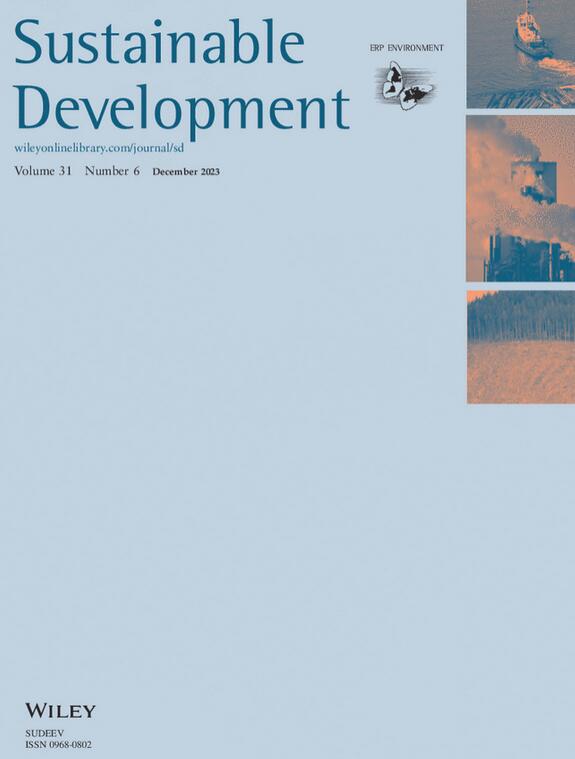量化可持续发展目标在亚非国家的系统重要性:网络层次分析
IF 8.2
1区 环境科学与生态学
Q1 DEVELOPMENT STUDIES
引用次数: 0
摘要
亚非国家在实现 2030 年议程方面面临挑战,需要科学支持以取得进展。研究的重点是重新组织重要的可持续发展目标(SDGs)和具体目标,以评估其在这些国家的优先次序,同时考虑到内部的相互作用。以往的研究主要考虑了可持续发展目标之间的一阶互动,而一些学者则强调了高阶互动的重要性,因为高阶互动会放大可持续发展目标的影响并导致系统转型。针对这一问题,我们提出了一种基于网络层次分析的方法,利用特定国家目标层面的互动网络,考虑 26 个亚非国家可持续发展目标的高阶互动,量化我们所称的可持续发展目标的 "系统重要性"。通过分析结果,我们得出以下结论。目标 13-17 的系统重要性最高,大多数目标在系统中都很重要。系统重要性较低的目标仍包括一些特殊目标,如目标 4、10 和 12 中分别与技术能力、国际代表性和奖学金有关的目标。26 个亚非国家的具体目标和可持续发展目标的系统重要性排名相似,但老挝人民民主共和国和印度尼西亚的数值范围较大,需要进一步关注具有系统重要性的具体目标和目标。此外,某些国家在特定目标方面的系统重要性明显更高,如大韩民国的目标 4 和新加坡的目标 7。本研究通过考虑高阶互动产生的深远影响,为亚非国家确定可持续发展目标的优先次序提供了定量支持。本文章由计算机程序翻译,如有差异,请以英文原文为准。
Quantification of systemic importance of SDGs in Asian‐African countries: A network hierarchy analysis
Asian‐African countries face challenges in achieving the 2030 Agenda and require scientific support for progress. Studies have focused on reorganizing important Sustainable Development Goals (SDGs) and targets to assess their priorities in these countries considering internal interactions. While previous studies mainly considered first‐order interactions among SDGs, some scholars have emphasized the significance of high‐order interactions that amplify SDG impacts and lead to systemic transformations. To address this, we propose a network hierarchy analysis‐based method to quantify what we called “systemic importance” of SDGs considering high‐order interactions of SDGs in 26 Asian‐African countries using country‐specific target level interaction networks. By analyzing the results, we draw the following conclusions. Goals 13–17 have the highest systemic importance, with the majority of targets being important in the system. Goals with lower systemic importance still include exceptional targets, such as targets related to technological capacity, international representation, and scholarships within Goals 4, 10, and 12, respectively. The rankings of systemic importance for targets and SDGs are similar among the 26 Asian‐African countries, but Lao PDR and Indonesia exhibit larger numerical ranges that require further attention to systemically important targets and goals. Additionally, certain countries show significantly higher systemic importance in specific goals, such as Goal 4 in the Republic of Korea and Goal 7 in Singapore. This study offers quantitative support for prioritizing SDGs in Asian‐African countries by considering the profound impacts resulting from high‐order interactions.
求助全文
通过发布文献求助,成功后即可免费获取论文全文。
去求助
来源期刊

Sustainable Development
Multiple-
CiteScore
17.30
自引率
11.20%
发文量
168
期刊介绍:
Sustainable Development is a publication that takes an interdisciplinary approach to explore and propose strategies for achieving sustainable development. Our aim is to discuss and address the challenges associated with sustainable development and the Sustainable Development Goals. All submissions are subjected to a thorough review process to ensure that our readers receive valuable and original content of the highest caliber.
 求助内容:
求助内容: 应助结果提醒方式:
应助结果提醒方式:


